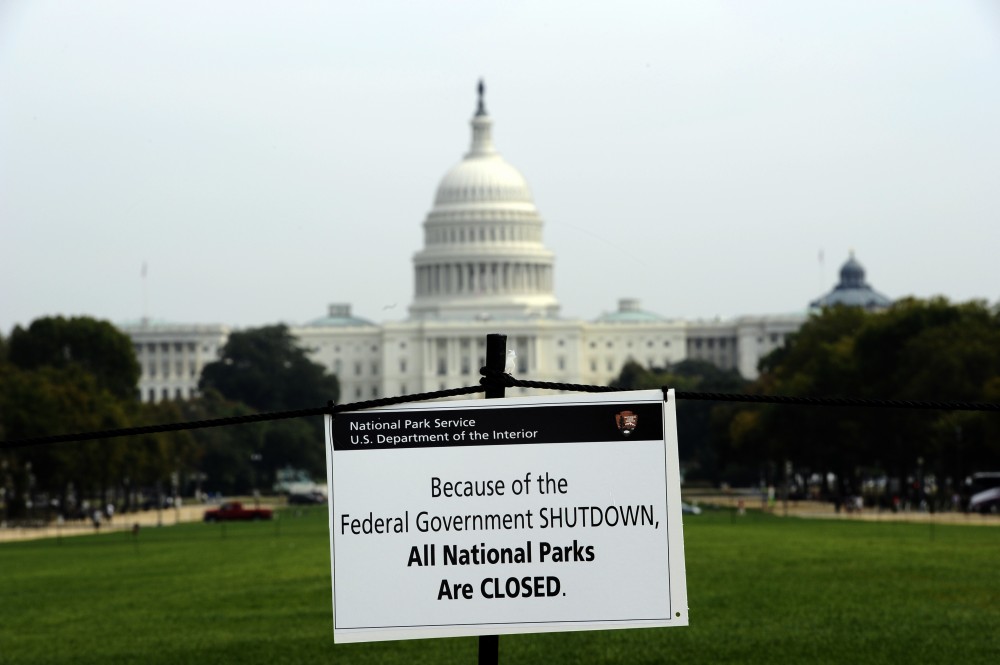Government shutdown: are GVSU students, staff and faculty directly affected?

Courtesy / JEWEL SAMAD/AFP/Getty Images
Jan 14, 2019
As the United States government enters its fourth week being shut down, students may be wondering: is Grand Valley State University being affected directly? Several political science professors say that it is possible.
In terms of being affected directly on the GVSU campus, the GVSU Office of Financial Aid shared that some students are being more directly affected more than others.
“An agreement to fund the Department of Education was passed earlier in 2018, so there is no direct effect on federal financial aid funds,” said Associate Director of Financial Aid and Scholarships Francesca Golden.
“We are affected indirectly by other departments in the government being closed. For example, students that need specific documents from the IRS to verify FAFSA data are unable to retrieve them due to the IRS being closed. However, we are working very closely with students affected by this.”
Golden said that the IRS closure may result in implications on tax filing for student employees, faculty and staff on campus, as well in the future.
“The shutdown will most likely last a few more weeks,” said Donald Zinman, a professor in GVSU’s political science department. “The president is not a good negotiator outside of his business profession, but I think he sees the stakes as very high for him; his supporters really want that wall.”
Following a “big victory” for democrats in the House, Michelle Miller-Adams, a GVSU political science professor, cites a lack of agreement in how to use funds as the root issue in the shutdown.
“The government shutdown is occurring because President Donald Trump is trying to make good on his campaign promise of building a wall even though experts, some members of his own party, democrats and many members of the public do not believe that this is the best use of public funds,” Miller-Adams said.
“President Trump does not seem to accept that he must share power with other branches of government, per the Constitution.”
The length of the shutdown has been the center of attention for politicians and citizens alike. Miller-Adams said that with an unprecedented shutdown, unprecedented action will be what it takes to reopen the government.
“At this point, (President Trump) has dug himself into a hole that will be hard to get out of, since he cannot now back away from his promise without alienating his base,” Miller-Adams said. “My guess is that he will end up declaring a state of emergency to shift military funding to build the wall, then the government will reopen. It would be a way out of the impasse, but it is a tremendous break with precedent. No president has ever declared a state of emergency and shifted funding because his legislative priorities were not embraced by Congress.”
These sentiments were echoed by other professors.
“(President Trump’s) border wall is his most crystal clear campaign promise that, more than anything, represents what the Trump presidency is all about,” Zinman said.
“If he can’t deliver on that, he may go into the 2020 campaign weakened. Having said that, just because the wall was his ironclad campaign promise doesn’t make it good public policy. That said, at a certain point, republicans in Congress may decide that his campaign promise is no longer worth shutting down the government.”
Zinman said that usually Congress approves budgets by the statutory deadline, which is April 15. If not, all affected agencies and departments must shut down all functions and employees deemed “non-essential” are furloughed.
During budget disagreements, Congress and the president often enact a continuing resolution, so as to keep the government running temporarily at existing spending levels. That has not happened in this case, as President Trump took the decision into his own hands.
Miller-Adams says that all citizens are affected by the shutdown, whether or not they work for the federal government. While students, staff and faculty may not directly be paid by the government, usage of government facilities and functions are widespread.
The implications are far-reaching. They include our national parks being disrupted, no more safety inspections to the food we eat, reduced safety inspections in places such as airports resulting in longer lines, immigration courts not functioning and government websites being down. Miller-Adams said that everyday lives are affected, one way or another.

























